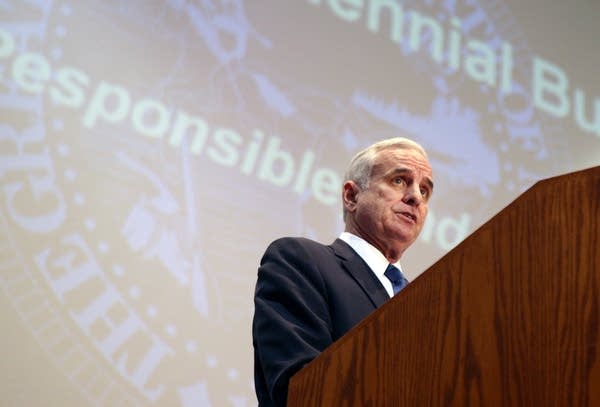Dayton's K-12 plan: Shift stays, more all-day kindergarten

Gov. Mark Dayton's budget proposal includes a small increase for K-12 education. Most of that new money would be spent on increasing the number of children enrolled in all-day kindergarten.
Dayton proposes spending $14.2 billion on K-12 education in the upcoming two-year budget cycle. That's about $900 million more than the state allocated for the current biennium, but the increase won't feel that large to schools.
That's because most of it replaces one-time federal stimulus money that's no longer available, or results from anticipated enrollment increases that will drive up per-pupil payments.
State officials say $14.2 billion is essentially a level that keeps funding flat for schools.
Create a More Connected Minnesota
MPR News is your trusted resource for the news you need. With your support, MPR News brings accessible, courageous journalism and authentic conversation to everyone - free of paywalls and barriers. Your gift makes a difference.
Still, the governor can claim he kept a campaign promise to increase education funding because his budget does include $52 million in new money. Education Commissioner Brenda Cassellius lauded the funding boost at this morning's budget presentation.
"If we want to be nation-leading and not just in the middle of the pack, or lagging behind as it pertains to our gaps, then we must invest now," she said. "The myth that we can somehow get better results without new investments is a proven fallacy."
Cassellius said all the new spending is aimed at closing the achievement gap between students of color and white students. About two-thirds of the new money would be spent on all-day kindergarten programs.
Right now, less than half, 44 percent, of the state's school children are in an all-day, every-day kindergarten program. The state hopes to boost that percentage by offering to provide more state funding for every kindergartner who lives in poverty.
The boost is meant to be an incentive. Dayton is not proposing a mandate that all districts provide all-day, every day kindergarten.
About 15 percent of the state's kindergartners are enrolled in programs where a fee is charged. Those districts would have to drop those fees to get the new funding.
Spring Lake Park, in the north metro, is one district where some families pay fees. Superintendent Jeff Ronneberg said he's pleased with the proposed funding boost, but he hasn't yet analyzed whether the boost in state funding would offset the money lost by dropping the fees.
"It's really that tuition that allows us to have resources for the teachers' salary, the curricular aspects of the program and to have those things in place to have a quality program," he said.
Dayton's budget does not make any major changes to the state's overall funding formula structure.
One exception to that is the teacher merit pay program Q-Comp that former Gov. Tim Pawlenty championed. Dayton is proposing a cap.
Current Q-Comp districts would still get funding, but no new districts would be able to join. The cap would not effect Anoka-Hennepin, the state's largest district, which was recently approved for the program but hasn't yet received funding. The district's teachers still have to sign off on the plan.
The governor's budget proposal also leaves in place a funding shift that was employed to reduce the deficit in the current budget cycle.
The state saves money in one fiscal year by shifting promised payments to schools into the next year. The shift has resulted in real costs when districts have run short of cash.
One survey estimated the shift cost metro-area districts more than $5 million, partially because of the interest they had to pay on short-term loans.
Still, officials say even a continued shift is better than reduced funding.
"We are maintaining with this shift in funding; we're doing okay," said Colleen Mertesdorf, budget director for the Fairbault district in southern Minnesota, and also president of the statewide association of school budget officers. "Some districts have to borrow, some are okay. But it would be worse to have a permanent cut in the formula allowance."
The governor's budget now faces an uphill climb at the Capitol. While Republican leaders in both the House and Senate strongly criticized the governor's tax increase proposal, the tone on education was notably different from Rep. Pat Garofalo, R-Farmington, who chairs the education finance committee.
"I made an agreement with Gov. Dayton that I'm not going to criticize his budget proposals publicly because we have too big of a problem to deal with here, and my energy and focus needs to be on if I don't like the governor's ideas, I need to offer alternative strategies to accomplish the same goals," he said.
Garofalo says he will do just that when he and other finance committee chairs offer their own plans next month.
